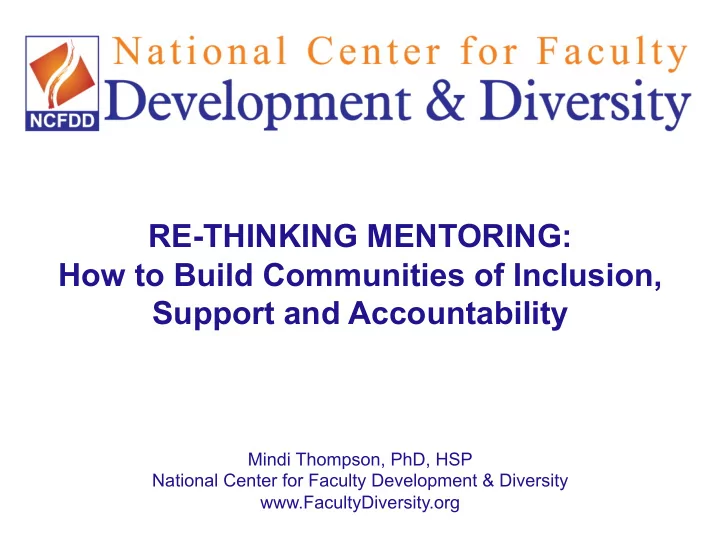

RE-THINKING MENTORING: How to Build Communities of Inclusion, Support and Accountability Mindi Thompson, PhD, HSP National Center for Faculty Development & Diversity www.FacultyDiversity.org
Today’s Facilitator: Mindi Thompson • Tenured professor at University of Wisconsin- Madison • Registered Health Service Psychologist • Faculty Success Program Head Coach www.FacultyDiversity.org
TODAY’S TALK 1. Challenges faculty members face 2. Re-thinking mentoring 3. The NCFDD Model www.FacultyDiversity.org
PART I: CHALLENGES FACULTY FACE
TENURE-TRACK CHALLENGES The tenure-track is stressful for ALL faculty due to: q Varying degrees of preparation for ALL aspects of the job q Minimal feedback and support q Unclear criteria for promotion & tenure q Ever-escalating expectations for research and funding q Need to front-load research portfolio q Long probationary period (6 years) followed by a series of high-stakes, yet anonymous votes
“SOLO” CHALLENGES Additionally, under-represented faculty commonly describe: q Struggling to find time for research given diversity requests q Experiencing emotional exhaustion from differential classroom dynamics q Managing visibility, invisibility and belonging q Lack of collegial acceptance (mentors but not sponsors)
POST-TENURE CHALLENGES Full Professor Administration Disciplinary Super-Star Public Intellectual Master-Teacher Institutional Change Agent Investing Energy Elsewhere TENURE Pre-Tenure
COMMON OUTCOMES All of these challenges can lead to … q A negative impact on productivity during the transitions q Engaging in self-isolation as a protective defense mechanism q Emotional exhaustion and anxiety q Stress-related illness q Strained relationships q Thoughts of leaving the Academy
PART II: RE-THINKING MENTORING
RE-THINKING MENTORING CONVENTIONAL WHAT’S WISDOM MISSING Mentoring is “Mentoring” means different really important! things to different people Mentoring = magical Identifying faculty needs & relationship between faculty getting them met Faculty have the time, energy, Mentoring is time-intensive, and desire to serve as mentors invisible, & unrewarded labor Once tenured, faculty no longer Every transition requires need mentoring new skills & support What worked in the past, Expectations today are far should work today greater than the past
RE-THINKING MENTORING Each step on the academic ladder is a new game with new rules (written and unwritten), new questions, and new challenges … Professor Associate Professor Assistant Professor Post-Doc Graduate Student The most efficient way to make a transition is to build a network of mentors, sponsors, and collaborators that meet new rank-appropriate needs.
Re-Think Mentoring Professional Development Substantive Emotional Feedback Support Intellectual Access to Community Opportunities Role Sponsorship Models Accountability for what REALLY Matters
Ask: What do I need? How can I get it? Professional Development Substantive Emotional Feedback Support Faculty Intellectual Access to Community Member Opportunities Role Sponsorship Models Accountability for what REALLY Matters
This is Mentoring text
PART III: THE NCFDD MODEL
Ask: What do I need? How can I get it? Professional Development Substantive Emotional Feedback Support Faculty Intellectual Access to Community Member Opportunities Role Sponsorship Models Accountability for what REALLY Matters
The NCFDD Mentoring Model Professional Development Substantive Emotional Feedback Support Faculty Intellectual Access to Community Member Opportunities Role Sponsorship Models Accountability for what REALLY Matters
Biggest Mistakes Faculty Make The Core Challenge: The things that matter most have the least built-in accountability Most faculty prioritize based on accountability This is why the NCFDD model is based on teaching Concrete Skills & Strategies Creating Accountability Structures for Research Productivity
Biggest Mistakes Faculty Make Pain Point: I’m working all the time but I’m not being productive Criteria for Tenure & Typical New Faculty Promotion Member 2% 10% 28% 20% 70% 70% Research Teaching Service Research Teaching Service
New Skill: Daily Writing Academics often imagine they must have long Write Every unbroken stretches of time to write, but the demands of an academic career Day seldom allow this luxury. Daily writing leads to steady productivity and 30-60 fewer feelings of anxiety over failure to minutes meet expectations for productivity. Mental shift: writing is the most important part First thing in of my long term success, therefore it’s my the top priority. morning Behavior shift: I write every day and create a way to be accountable that works for me.
NCFDD Core Curriculum
1) Campus Workshops
2) Annual Membership
2) Annual Membership q Weekly productivity tips ( Monday Motivator ) q Monthly core curriculum webinars q Monthly guest expert webinars 1. How to Negotiate Your First Book Contract 2. Time Management for New Parents 3. Teaching in Color q Multi-week courses: 1. Publishing 2. Winning Grants 3. Writing Science q Community: online forums, buddies, challenges …
3) FACULTY BOOTCAMP
3) FACULTY BOOTCAMP 12-Week Mentoring Intensive: Faculty create semester work plans § Weekly community training module § Weekly accountability groups facilitated by § tenured faculty coaches On-call mentoring § Daily tracking via an online community § This is where we DISRUPT and RESTRUCTURE daily decision-making and time management
MENTORING PROCESS Plan Challenge Establish Test Best Analyze the Limiting A Mentor Practices Your Data Path Beliefs Network
This process is facilitated by COACHES COACHES: • Are performance- driven • Ask powerful questions • Facilitate a process
www.FacultyDiversity.org
Recommend
More recommend